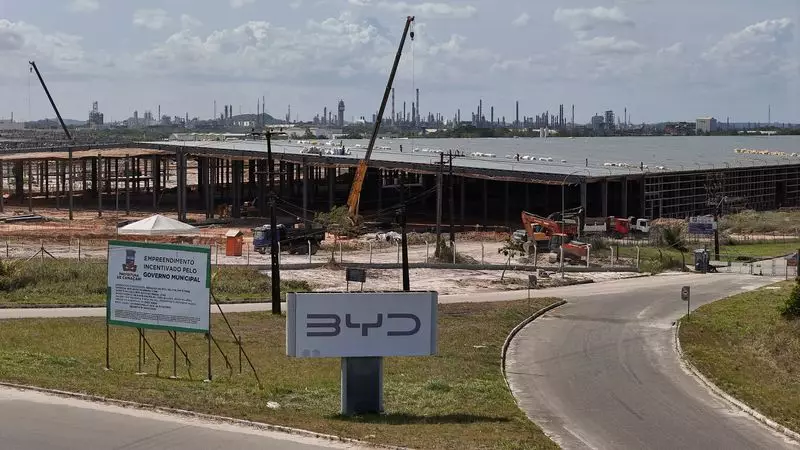The expansion of BYD (Build Your Dreams), a prominent electric vehicle manufacturer, into Brazil has been marred by serious allegations surrounding labor practices and immigration violations. A recent investigation has uncovered the employment of hundreds of Chinese workers under irregular visas, leading to claims of “slavery-like conditions” on the factory site. This situation not only raises ethical questions regarding labor standards but also puts a spotlight on the complexities of international business relations amid growing geopolitical ties.
Reports indicate that 163 Chinese workers were rescued last December under alarming conditions—a revelation that has ignited outrage among labor rights advocates and the public at large. Liane Durao, a labor inspector with Brazil’s Ministry of Labor, has been at the forefront of the investigation, which began in response to concerns about how these individuals were treated. Durao has underscored that the employment practices observed were decidedly irregular, and BYD is expected to face financial penalties for each worker found in a compromised situation. The firm has committed to modifying the working conditions for the remaining employees, which raises essential questions: How will BYD ensure compliance with local labor laws, and what measures will be put in place to avoid future violations?
The Context of China’s Influence in Brazil
BYD’s investment in Brazil is not merely a business venture; it represents a broader strategic alignment between China and Brazil. With $620 million funneled into creating a factory that aims to produce 150,000 vehicles, BYD is positioning Brazil as its largest market outside China. However, this ambitious expansion comes at a cost to the very essence of labor rights, as evidenced by the current situation. The Brazilian government, under President Luiz Inacio Lula da Silva, has a vested interest in creating local jobs; yet, the practice of importing Chinese workers undermines these objectives, complicating the relationship between the two nations.
The situation escalates when considering the broader implications of these labor violations, which have been characterized as instances of human trafficking by Brazil’s labor prosecutor’s office. The withholding of passports from a portion of the workforce only serves to exacerbate the gravity of the situation. It raises fundamental ethical questions about the responsibilities multinational corporations have toward their employees, particularly in contexts where labor laws are drastically different from their home countries.
Furthermore, reports suggest that current investigations might lead to stringent consequences, including restrictions on access to financing for companies found guilty of employing such labor practices. This could fundamentally alter how companies engage with local economies in Brazil and serve as a warning to others contemplating similar moves.
As BYD continues its quest for international expansion, the company must tread carefully in balancing its growth ambitions with compliance and ethical labor standards. Positive strides in creating jobs and investing in local economies could forge beneficial relationships with host nations. However, if the allegations against its practices in Brazil remain unaddressed, they could impede the firm’s aspirations and considerably affect its reputation on a global scale.
Ongoing labor inspections will continue to monitor BYD’s operational activities, ensuring that such treatment is not repeated. For a company that has already secured a monumental position in the auto industry, primarily in the immense Chinese market, the missteps in Brazil could profoundly impact its future domestic and international endeavors.
The unfolding narrative surrounding BYD in Brazil illustrates the intricate challenges multinational companies face as they navigate global markets. The need for compliance with local laws and labor standards cannot be overstated, particularly in an era where corporate social responsibility is increasingly scrutinized. For BYD, the outcome of these investigations will not only dictate its operational capacity in Brazil but also shape the future of its global strategy in a rapidly evolving automotive landscape. Consequently, how BYD addresses these critical labor issues in Brazil will resonate beyond its factory walls, influencing perceptions of corporate ethics in international business for years to come.

